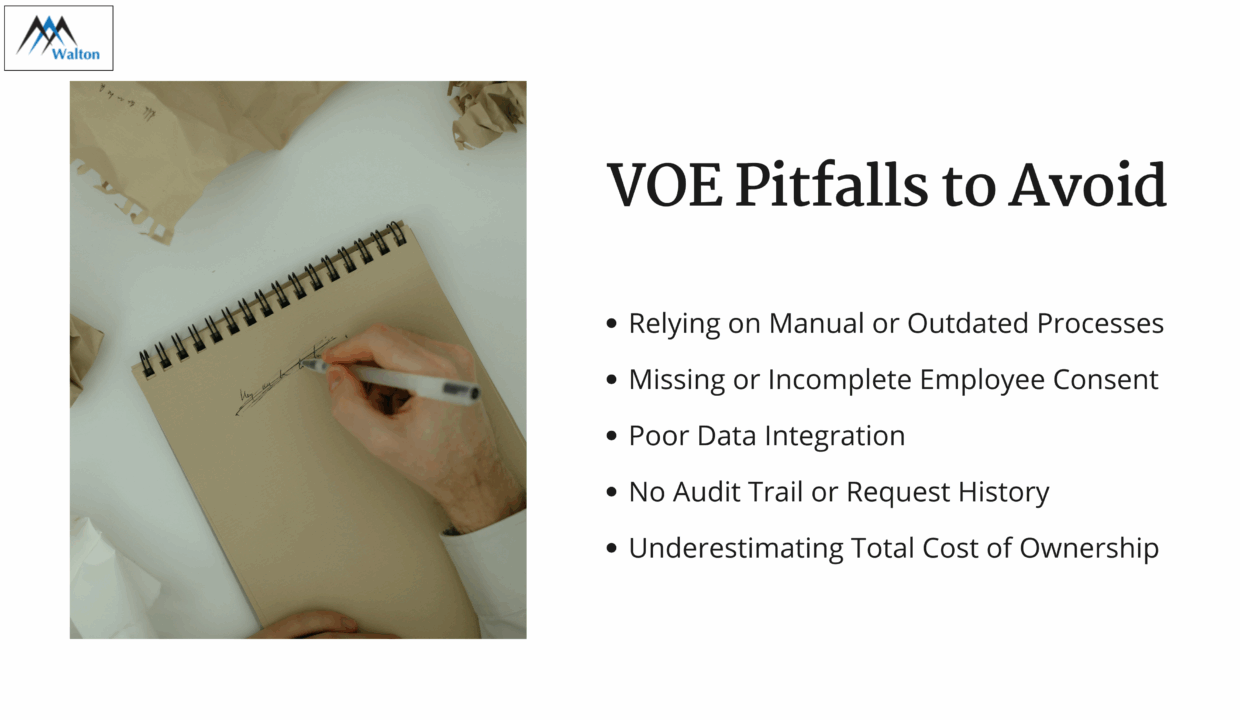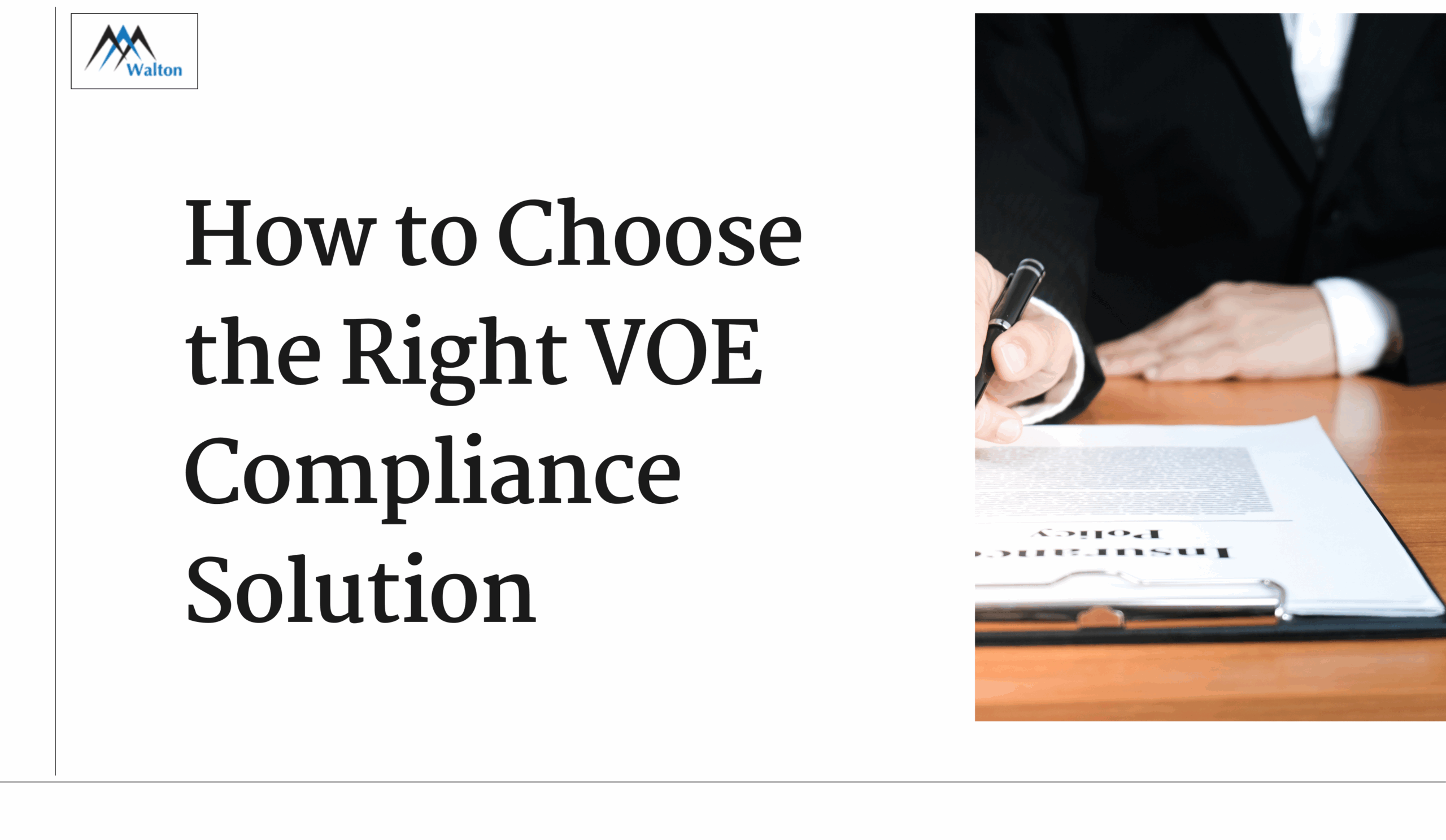In today’s workforce landscape, employment and income verification is no longer just a back-office task, it’s a compliance-critical function that directly impacts your organization’s legal standing, operational efficiency, and employee trust. Whether responding to government inquiries, lender requests, or internal audits, Verification of Employment (VOE) must be handled with speed, accuracy, and full compliance with federal regulations like the Fair Credit Reporting Act (FCRA).
For HR and payroll leaders, the challenge isn’t just doing VOE, it’s doing it right. That means finding a solution that not only integrates with your existing systems, but also protects sensitive data, supports employees, and scales with your workforce.
With multiple providers in the market, each promising automation, compliance, and simplicity, how do you cut through the noise and choose a VOE compliance solution that actually delivers?
This guide will walk you through:
- What to look for in a VOE provider
- Common pitfalls to avoid
- Compliance benchmarks for 2025
- How to evaluate ROI with tools like Walton’s VOE Savings Calculator
Let’s begin by understanding what VOE compliance actually involves, and why it’s more important than ever.
What Is VOE Compliance and Why It Matters
Verification of Employment (VOE) is the process of confirming an individual’s current or past employment status and income. It’s commonly required by mortgage lenders, government agencies, background screening firms, and sometimes by employers themselves for internal or external audits.
While the concept sounds simple, VOE is tightly regulated and increasingly complex. Employers are responsible for providing accurate, timely, and compliant responses that protect both employee data and company liability. With growing demand for real-time verifications, and increasing scrutiny from regulators, handling VOE in-house using manual or outdated processes can be risky.
Why VOE Compliance Is Critical in 2025:
- FCRA Requirements: If VOE data is used for credit, housing, or employment decisions, the Fair Credit Reporting Act (FCRA) requires that employee consent is obtained and that employees can dispute inaccuracies.
- Data Privacy Regulations: Employers must follow strict data protection standards, particularly with increasing state-level privacy laws (e.g., CCPA, CPRA).
- Audit Risk & Exposure: Incomplete logs, undocumented requests, or incorrect data can create legal exposure during audits or disputes.
- Workforce Expectation: Employees expect that their sensitive information is handled securely and without unnecessary delays, especially when a job offer, loan, or housing depends on it.
Manual VOE = High Cost & High Risk
Traditional methods like fax, email, or phone-based verifications are slow, error-prone, and resource-intensive. Without proper logging or security, your organization may inadvertently violate compliance standards or miss important requests.
That’s why more employers are shifting to automated, third-party VOE platforms that handle the entire process, securely, accurately, and with real-time transparency.
Essential Features of a Top-Tier VOE Compliance Solution
Not all VOE providers are created equal. While most promise speed and automation, only a few truly deliver the security, compliance, and integration capabilities modern HR departments require. To avoid vendor lock-in, audit failures, or data mishandling, it’s important to evaluate your VOE solution across several key dimensions.
1. Real-Time Access and Data Accuracy
Speed matters, but so does accuracy. Your VOE provider should deliver verifications in real time, using verified payroll data. This ensures faster turnarounds for third-party requests (like lenders) while maintaining integrity.
Look for:
- Instant verification capabilities
- Verified payroll-backed employment and income data
- Low error rate and dispute handling mechanism
2. Seamless Integration with Payroll & HRIS Platforms
Your VOE solution must integrate effortlessly with your HR or payroll system, whether that’s Workday, ADP, Paychex, or a custom setup. This ensures real-time updates and reduces manual effort from HR teams.
Look for:
- API-based and SFTP integration options
- Support for leading HRIS/payroll platforms
- Automatic syncing with employee records
3. Secure Data Handling and Employee Consent
Any VOE process must prioritize employee data privacy. Compliance with FCRA, EEOC, and data privacy laws requires clear documentation, secure delivery, and PIN-based employee consent for each verification.
Look for:
- Encrypted data at rest and in transit (SOC 2 Type II, ISO standards)
- PIN-secured or e-signed employee consent workflows
- Role-based access and audit trails
4. Scalable Support for Any Workforce Size
Whether you’re a startup or a Fortune 100 employer, your VOE solution should scale to handle thousands of requests without breaking SLAs or compromising compliance.
Look for:
- Multi-channel request support (lenders, agencies, government)
- Bulk upload and batch processing capabilities
- Dedicated support teams for implementation and training
5. Built-In Audit Trails and Compliance Reporting
A robust VOE solution will generate detailed logs of every request, what data was shared, when, and with whom. This is vital in the event of an audit, dispute, or regulatory inquiry.
Look for:
- Timestamped logs of all verifications
- Consent history tracking
- Downloadable reports for internal compliance or audits
With these core features in place, you’ll not only simplify your VOE process, you’ll also safeguard your workforce and organization against growing regulatory risks.
How to Evaluate VOE Vendors – 5 Key Questions
Choosing a VOE compliance partner isn’t just about features, it’s about trust, transparency, and long-term support. To ensure your organization is making the right choice, ask these five essential questions during your vendor evaluation process:
1. Do They Offer Both Automated and Manual Verification?
Some vendors only offer instant verification for a narrow employer network, leaving gaps for smaller or non-traditional employers. Look for a provider that offers both instant verifications and a manual fallback process, without sacrificing turnaround time.
Why it matters: Coverage gaps can delay critical verifications and frustrate employees or verifiers (e.g., lenders, agencies).
2. What’s Their Data Coverage and Payroll Integration Capability?
A strong VOE solution should integrate with your payroll or HRIS systems, ensuring data accuracy and real-time syncs. Ask about compatibility with ADP, Paychex, Workday, or your existing system.
Why it matters: Real-time integrations eliminate manual errors and ensure compliance-ready records.
3. How Do They Handle Security, Consent, and FCRA Compliance?
Your provider must offer secure, encrypted data transfers and collect employee consent for each verification per FCRA standards. Look for PIN-based access or secure portals to confirm that the process protects employee rights.
Why it matters: Mishandling employee data can lead to lawsuits, fines, and reputational damage.
4. Do They Provide Transparent Audit Logs and Reporting Tools?
Ask if you’ll have access to timestamped logs, consent trails, and downloadable reports for internal reviews or audits. The ability to demonstrate compliance is as important as being compliant.
Why it matters: In the event of a government audit or FCRA dispute, clear documentation is your best defense.
5. What Kind of Support, Training, and Customization Is Offered?
A good VOE vendor should act as a true partner, offering white-glove onboarding, ongoing support, and the ability to customize workflows based on your organization’s needs.
Why it matters: Many issues arise during implementation or when requests spike, having a responsive support team is critical.
Pro Tip: Use this list as a vendor scorecard during demos or RFPs. Not all providers, including major ones, will meet these standards.
VOE Pitfalls to Avoid, And How to Outsmart Them
Even well-intentioned HR teams can run into costly issues if their VOE process isn’t aligned with compliance standards or technological best practices. Here are some of the most common mistakes employers make, and how to avoid them:

1. Relying on Manual or Outdated Processes
Many companies still handle verifications through fax, phone, or email, often without proper logging or authorization. These methods are not only slow and labour-intensive but also expose the organization to human error and compliance failures.
Solution: Choose a provider that automates the process end-to-end, while maintaining audit trails and secure consent management.
2. Missing or Incomplete Employee Consent
FCRA regulations require that employees authorize third-party employment verifications, especially when related to credit, housing, or job eligibility. Failure to collect or document consent puts your organization at legal risk.
Solution: Use a platform that supports PIN-based or electronic employee consent, stores the history of authorization, and allows for easy retrieval in case of dispute.
3. Poor Data Integration
A VOE solution that doesn’t sync with your payroll or HR systems will quickly become a bottleneck. Manual data uploads can lead to mismatches, outdated information, and inefficiencies across your compliance process.
Solution: Ensure the solution integrates with your HRIS or payroll software, ideally via API or automated batch upload.
4. No Audit Trail or Request History
Without centralized tracking, your team can’t verify which requests were completed, when, and how. In the case of an audit, this lack of documentation can be damaging.
Solution: Insist on timestamped logs for every request, including the data shared, recipient, method of delivery, and consent status.
5. Underestimating Total Cost of Ownership
Some VOE vendors charge the employer for every transaction, while others, like Walton Management, pass costs to verifiers (lenders, agencies). Failing to calculate your internal labor + vendor costs can result in budget surprises.
Solution: Use a tool like the VOE Savings Calculator to project real savings before committing to a solution.
Avoiding these pitfalls can mean the difference between a compliant, stress-free VOE program and one that’s reactive, time-consuming, and high-risk.
Related article: Employment Background Check in the USA: What Companies Verify
Why Walton Management Leads in VOE Solutions?
As organizations evaluate VOE vendors, it’s important to distinguish between surface-level features and true compliance-driven infrastructure. Walton Management Services stands out by offering a fully integrated, cost-efficient, and secure VOE solution, built to scale with your business and shield you from legal exposure.
Here’s what makes Walton a leader in VOE compliance:
1. Zero-Cost to Employers
Unlike providers that bill employers for every verification, Walton’s model passes costs to third-party verifiers, like lenders and agencies, making the service free to your organization. You’ll reduce HR overhead without adding to your budget.
Benefit: Significant savings without compromising on compliance or coverage.
2. PIN-Based Consent + Data Encryption
Walton uses secure, PIN-authenticated employee consent workflows to meet FCRA requirements. Every verification is backed by AES-256 encryption and stored on SOC-certified systems, ensuring data is protected at every stage.
Benefit: Employee trust and full regulatory compliance with consent logs.
3. Real-Time Integration with HR and Payroll Systems
Through its proprietary ForeSite™ platform, Walton integrates directly with leading HRIS and payroll systems using APIs and secure file transfers. The result is faster verification, fewer errors, and less manual effort.
Benefit: Automated data sync reduces internal workload and improves verification speed.
4. Built-In Audit Trails and Reporting
Every verification is logged with full transparency, date, time, data fields released, requester identity, and consent record. Walton’s platform enables on-demand reporting for internal audits, legal reviews, or compliance needs.
Benefit: Always audit-ready, with no scrambling for documentation.
5. Dedicated Support and Seamless Onboarding
Walton offers white-glove implementation, UAT, training, and a responsive support team, ensuring your transition is frictionless. Their U.S.-based service center provides fast assistance for any manual verification requests or employee questions.
Benefit: A compliance partner, not just a vendor.
Walton Management combines over 40 years of workforce compliance expertise with next-gen technology to help HR teams reduce risk, save time, and scale verification operations confidently.
See the ROI: Use Walton’s Free VOE Savings Calculator
Before committing to any VOE compliance solution, it’s smart to evaluate your current costs, including internal labor, turnaround times, compliance risk, and vendor fees. Most HR leaders underestimate how much time and money manual or semi-automated processes really consume.
That’s where Walton’s Free VOE Savings Calculator comes in.
What the Calculator Does:
- Estimates your current cost per verification (labor + overhead)
- Projects savings based on Walton’s zero-cost-to-employer model
- Factors in volume, time spent, and vendor pricing
- Generates a simple savings report you can share with leadership
Whether you handle 50 verifications a year or 5,000, the calculator helps you build the business case for a smarter VOE process.
Why It Matters for HR Leaders and Payroll Teams
This tool isn’t just about cost, it’s about time, compliance protection, and strategic value. By shifting to an automated, audit-ready solution like Walton’s, you free up internal teams to focus on more impactful work.
With the calculator, you can walk into your next leadership meeting with hard numbers and clear ROI, not just anecdotes.
Conclusion: Future-Proof Your HR Compliance with the Right VOE Solution
As employment verification demands continue to grow, and regulations tighten, HR leaders need more than a checkbox approach to compliance. The right VOE solution isn’t just a tool, it’s a risk management strategy, a cost-saving opportunity, and a trust builder for your workforce.
Walton Management Services offers a unique blend of:
- Regulatory strength (FCRA, data privacy, audit readiness)
- Zero-cost implementation for employers
- Real-time automation with human-backed support
- Transparent, secure employee consent tracking
Whether you’re struggling with manual verifications, frustrated with your current vendor, or planning for future growth, now’s the time to evaluate your VOE approach.

